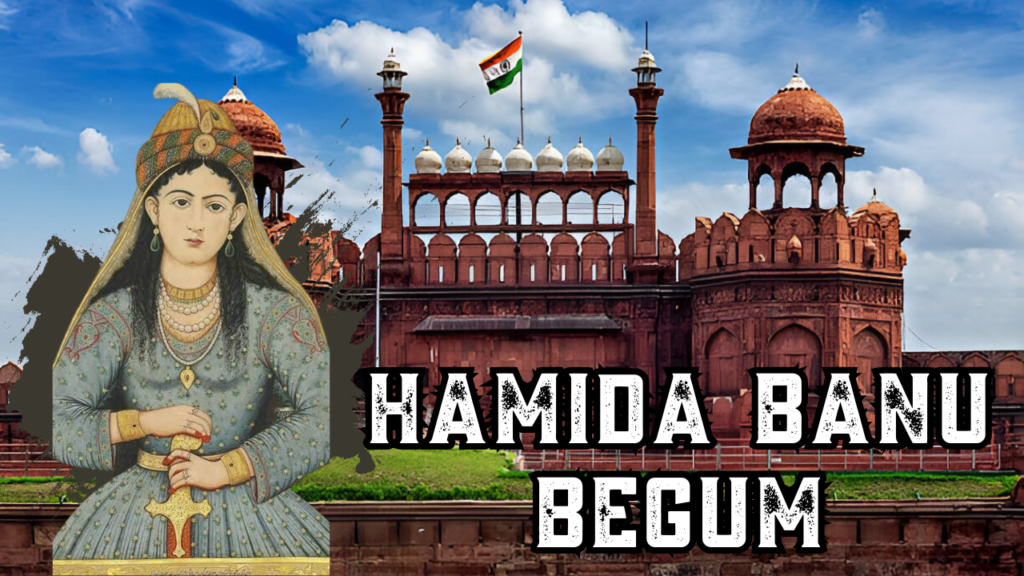
Hamida Banu Begum
Hamida Banu Begum, a name not as widely recognized as some other figures of the Mughal Empire, was a pivotal figure in shaping the course of Indian history. As the mother of one of the most notable Mughal emperors, Akbar, Hamida Banu Begum holds a prominent yet understated place in the annals of the Mughal dynasty. Her life, although not extensively chronicled in mainstream history, was crucial not only in the context of her son’s rise to power but also in the cultural and political milieu of her time.
Early Life and Background of Hamida Banu Begum
Hamida Banu Begum was born into a noble family in the year 1527. She hailed from the Safavid dynasty of Persia, the family of Shah Ismail I. Her father, Shaikh Ali Akbar, was an influential man in the Persian court. Given her Persian roots, Hamida Banu Begum’s early life was characterized by the customs and traditions of the Safavid court, which was itself an empire of remarkable cultural richness, known for its art, architecture, and poetry.
Her early marriage was to the famous Mughal emperor, Emperor Humayun, the second ruler of the Mughal Empire. Humayun’s reign, however, was marked by turmoil and military losses. After losing the throne to Sher Shah Suri, Humayun went into exile, and it was during this period of instability that Hamida Banu Begum played a significant role in providing emotional and physical support to the Mughal emperor.
Marriage to Humayun
Hamida Banu Begum married Humayun in 1541, a time when the Mughal empire was in a phase of decline. Humayun had already faced considerable challenges, including losing the throne to Sher Shah Suri. Hamida, however, remained an unwavering companion during the turbulent years of Humayun’s exile.
During their years of exile, Hamida Banu Begum’s resolve and faith in her husband were integral to his eventual return to power. After Humayun’s return from exile in Persia, where he had sought refuge and support from the Safavid Shah, he regained the throne of India in 1555. It was during this period that she became a central figure in the Mughal court, and soon after, she became the mother of Akbar.
The Birth of Akbar
The birth of Akbar in 1542 is one of the defining events in Hamida Banu Begum’s life. Akbar would go on to become one of the most revered emperors in the history of India. Born in Umerkot, a small town in Sindh (modern-day Pakistan), Akbar’s birth is often marked by historians as an event that would change the future of the Mughal Empire.
Hamida’s pregnancy with Akbar was an event of great significance for the Mughal court, especially considering the fact that Humayun had faced difficulty producing a male heir before. In fact, there were many who questioned whether Humayun would ever have a legitimate successor to his throne. The birth of Akbar was a moment of immense relief for Hamida Banu Begum, who had longed for a child, and for Humayun, who had sought a male heir to continue his line.
Although the Mughal Empire was in a state of transition at the time of Akbar’s birth, Hamida Banu Begum’s maternal role would soon prove to be far-reaching. Her influence and wisdom were crucial in the upbringing of Akbar, shaping his worldview and preparing him for the heavy responsibilities of leadership.
Humayun’s Death and Hamida Banu Begum’s Role as Empress Mother
After Humayun’s death in 1556, Hamida Banu Begum’s role shifted from the wife of the emperor to the mother of the newly crowned emperor, Akbar. At the time of his father’s death, Akbar was only 13 years old, and thus, the leadership of the empire fell to the regents and advisors until he reached maturity. One of the most important regents during this period was Bairam Khan, a loyal general who served as a tutor and protector to the young emperor.
Hamida Banu Begum’s role during these early years of Akbar’s reign was to be a guiding force, offering counsel when necessary and providing emotional and familial stability to her son. As Akbar matured, she continued to maintain a quiet but important influence on his decisions, shaping his early policies, especially in matters of governance, religion, and diplomacy.
One of the most notable aspects of Hamida Banu Begum’s influence was her ability to advise Akbar in matters of statecraft. Hamida, coming from a background of Persian nobility, understood the importance of diplomacy and political alliances. Her experience, having witnessed the ups and downs of Humayun’s reign and exile, gave her valuable insights into how to navigate the complexities of the Mughal court.
The Cultural and Religious Influence of Hamida Banu Begum
Hamida Banu Begum’s influence on her son extended beyond the political sphere. Her understanding of Persian culture and religion also impacted Akbar’s approach to governance and his broadening of cultural horizons. Though Akbar is remembered for his religious tolerance and his efforts to create a syncretic Mughal culture, much of his sensitivity towards different cultures and religions can be traced back to the early years spent under the tutelage of his mother.
Hamida Banu Begum’s cultural influence on Akbar helped foster an environment that encouraged the arts, sciences, and literature. Her Persian heritage enriched the Mughal court’s cultural landscape, introducing poets, scholars, and artists from Persia, which later flourished under Akbar’s rule.
Her understanding of Islam and Persian literature also influenced Akbar’s policies, particularly in the realm of religious tolerance. She remained a devout Muslim, and although Akbar would later challenge traditional religious orthodoxy with his ideas of religious reform, it was likely her early teachings that shaped his initial outlook on Islam and the wider religious spectrum.
Hamida Banu Begum’s Later Years and Death
After Akbar’s ascendancy to full power, Hamida Banu Begum’s role in the court became less visible, but she remained a respected and powerful matriarch of the Mughal family. She spent her later years in peace, away from the direct affairs of the empire, but continued to support her son in his ambitions and policies. She witnessed the flourishing of the empire and the consolidation of Mughal power across India.
Hamida Banu Begum passed away in 1604, at the age of 77. Her death marked the end of an era for the Mughal dynasty, as she had been one of the last surviving figures from the generation that laid the foundation of the Mughal Empire. She was buried in a tomb in the old Mughal city of Delhi, an area that remains a symbol of the rich Mughal heritage she helped build.
Hamida Banu Begum’s Legacy
Hamida Banu Begum’s legacy is often overshadowed by the achievements of her son, Akbar. However, her contribution to the Mughal Empire, both as a mother and as a guiding force during critical moments of its history, cannot be understated. She not only provided the political and emotional support necessary for Humayun’s return to power but also played an instrumental role in raising Akbar, who would go on to become one of India’s greatest rulers.
Her legacy is also reflected in the ways she influenced Akbar’s religious and cultural policies, as well as in the manner in which she helped shape the Mughal court’s cultural environment. Under her influence, Akbar became a ruler who embraced Persian culture, welcomed scholars, and promoted religious tolerance, all of which contributed to the grandeur and legacy of the Mughal Empire.
Despite the relative scarcity of direct records about her life, Hamida Banu Begum’s importance in the history of the Mughal Empire is indisputable. As a mother, she nurtured and guided Akbar, and as a political figure, she contributed to the survival and success of the Mughal dynasty during some of its most challenging years.
Conclusion
Hamida Banu Begum was not only the mother of one of the greatest Mughal emperors but also an influential woman in the Mughal court who shaped the course of Indian history. Her legacy as a mother, advisor, and cultural force is one that should be remembered as an essential part of the story of the Mughal Empire. Through her wisdom, resilience, and influence, Hamida Banu Begum contributed to the stability of the Mughal dynasty and the greatness of her son, Akbar the Great.







